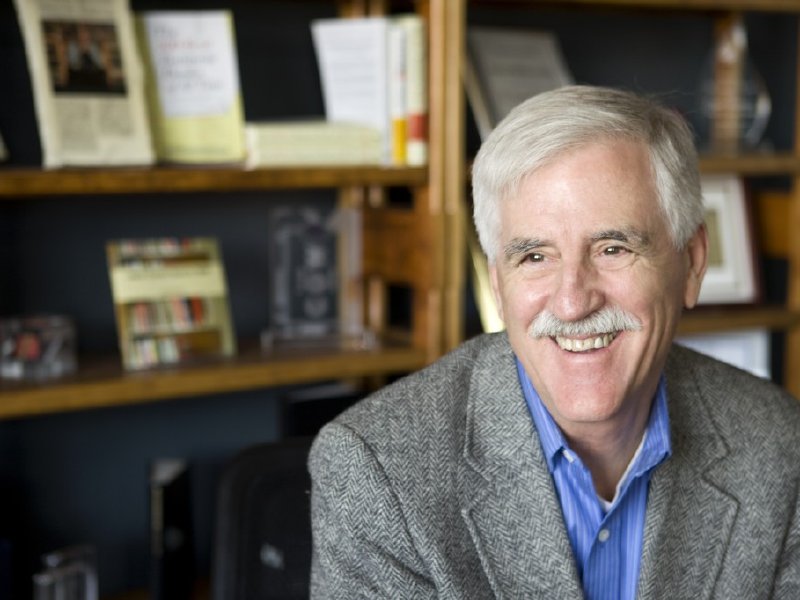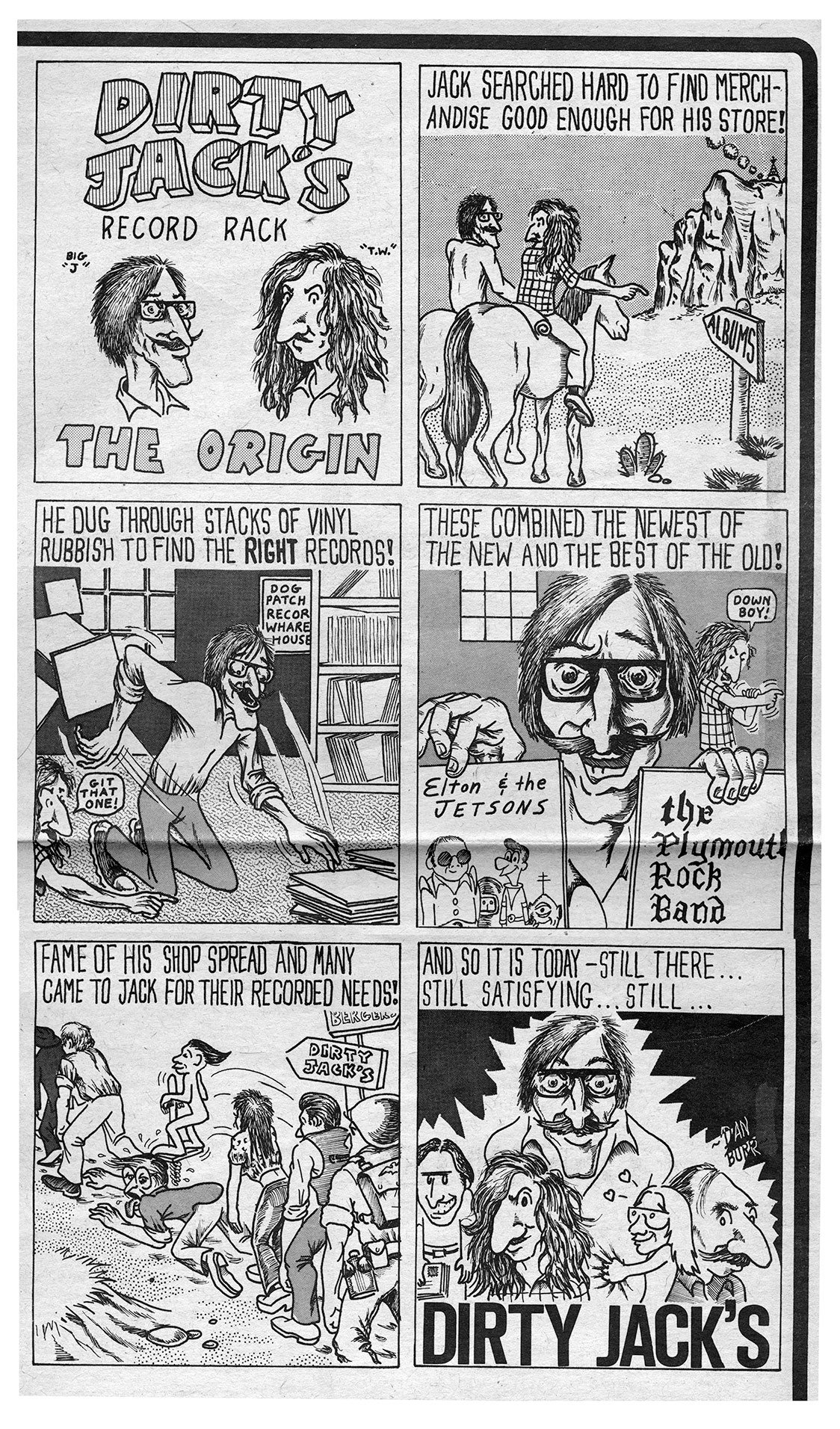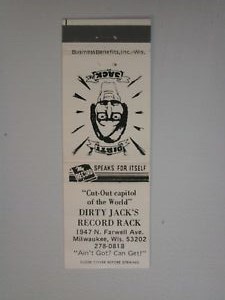 Jack Covert, in 2017, when he retired from his successful career in the book business, after a memorable start as a small Milwaukee record store owner. Courtesy onmilwaukee.com.
Jack Covert, in 2017, when he retired from his successful career in the book business, after a memorable start as a small Milwaukee record store owner. Courtesy onmilwaukee.com.
Dirty Jack hit the dirt hard, for the last time. It may be the last time, but I don’t know a music fan who dug deeper into music as a record buyer, and into album warehouses and personal collections, as an eager buyer-seller. Dan Burr’s Crumb-esque cartoon strip (below) illustrates that Jack Covert well, (taken from the linked obit by Dave Luhrssen of The Shepherd Express:)
I’m a bit late in acknowledging Jack, but last week I was distracted by writing about the death of Nanci Griffith, another great person who fit into the popular music world in her own slightly square-peg-in-a-round-hole way.
Dirty Jack’s Record Rack, on Farwell and Irving, was my favorite record store in my youth, even though I ended up becoming an album buyer at Radio Doctor’s Soul Shop and Peaches Records. 1
But in the early ‘70s, Jack’s Rack was closer to my Downer Avenue family home during college at UWM, even during my early years working at Radio Doctors. And Jack’s always had plenty of jazz in stock as well as rock, as Jack’s tastes leaned jazz-wise, as did mine. Plus, his hole-in-the-wall shop was THE PLACE for hole-in-the-corner “cut-out” LPs, a dream for a collection builder’s on a budget. 2.
And Jack knew how to buy and sell. I remember Jack several times almost physically escorting me to the cash register with an album I was unsure about. He also wasn’t shy about letting his crankiness show right in the store and, with that Snidely Whiplash mustache, you shoulda been a bit suspicious of this guy (see the snapshot photo in Dave’s obit piece). Yet I almost always was thankful he sold me.

Dan Burr’s affectionate cartoon history of Dirty Jack’s Record Rack. The store staff members in the last panel, below Jack, are (L-R) Ed Heinzelman,* album buyer Terry Wachsmuth, Mark Schneider and Chris Ballone. Courtesy Dan Burr and Shepherd Express.
Take a look at the smile in the photo at top, taken when he retired. Back in the day, Jack would jump on you, then flash that I’m-your-pal-with-three aces smile, whenever he and you needed it.
And how many record stores in the 1970s had custom marketing matches, with the owner’s beaming mug on them, proclaiming it “Cut-Out Capital of the World!” ?


Courtesy ebay.com
His second-in-command at the Rack was a slightly-built long-hair named Terry, who had a bit of Jack’s crankiness, in a more skittish way. But Terry really knew his stuff, as did Mark Schneider, the friendliest Jack’s employee, in my memory. Mark wore his erudition gracefully. Today the San Francisco-based Schneider — married to my former Milwaukee Journal colleague, rock critic Divina Infusino – comes to mind when I see Steve Earle’s guitarist Chris Masterson, who’s grown into a killer axe wielder since I last heard him live. Masterson, like Mark, has an affable personality and the same sort of long, ultra-blonde hair, and glasses. 1
I digress partly because I know Jack was a smart businessman who really valued and knew how to use his best employees. I think Mark would agree.
I also admit my comparisons of record store personnel to pop music artists may seem a bit over-the-top. But it’s something that I think Rob Fleming might nod his head to. He’s the slightly grandiose fictional owner of the record store in Nick Hornby’s wonderful novel High Fidelity, a comparison to Dirty Jack’s which Dave Luhrssen also makes aptly. I don’t think Jack or any of his guys floated through the sort of confused romanticism as does Rob (played by John Cusack in the hit film version). They knew how to channel their romantic impulses into music passions.
I had moved to Madison by the time Jack was hired at Schwartz Booksellers so I didn’t see him succeed as founder and president of 800-CEO-READ, a company that steered through the challenge from big box bookstores like Borders and Barnes & Noble and the rise of amazon.com “with ingenuity and a commitment to superior customer service for authors, customers, and the publishing houses themselves,” as the company’s press release on Covert’s death explains.
Jack Covert is also the co-author of 100 Best Business Books of All Time: What They Say, Why They Matter, and How They Can Help You (Link). The 100 Best has been translated into over 10 languages and the hardcover sold over 40,000 copies.
I’m still an “any-day-now-it-shall-be-released” author, but maybe Jack and I connected a bit because he also turned out to be something of a journalist. He wrote more than 600 monthly Jack Covert Selects business book recommendations that run in newspapers and business journals across the country, and has been featured on CNN and NPR, in Inc. magazine, Fortune, the Harvard Business Review, Washington Post, New York Post, BusinessWeek, and more.
That’s dealing in the big time. Not everyone in “big” business is a crooked wheeler-dealer. At this point, I’ll make no more personality comparisons to famous people.
Yes, Jack Covert had the smarts and personality, and always knew how to sell his stuff. I’m sure that mustachioed smile and those crafty ways are serving him well with Saint Pete at The Pearly Gates.
__________
- Thanks to Dirty Jack’s staffer Ed Heinzelman for background information.
1 Unlike Mark Schneider, Masterson may actually be albino, like his fellow guitar gunslinger Johnny Winter. But Masterson was tearing up “Hey Joe,” with Steve Earle at an even nastier pitch than on a 2017 video available on YouTube. I saw Earle and Masterson do that great murder ballad as an encore recently at Big Top Chautauqua in Bayfield, Wisconsin.
2. Cut-outs are out-of-print records, typically with a hole punched in the corner of an LP, or a mark obscuring the normal USBN scan bar. I suspect Jack Covert would later know very well how to find and market out-of-print books in a similar fashion.

